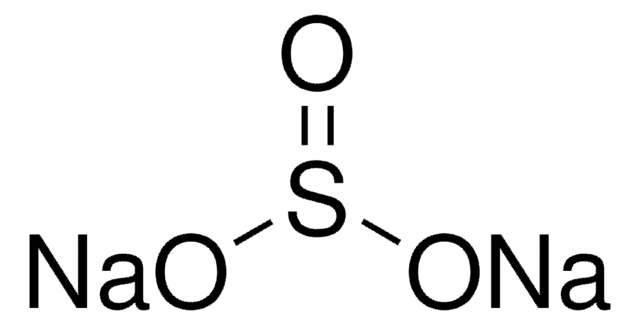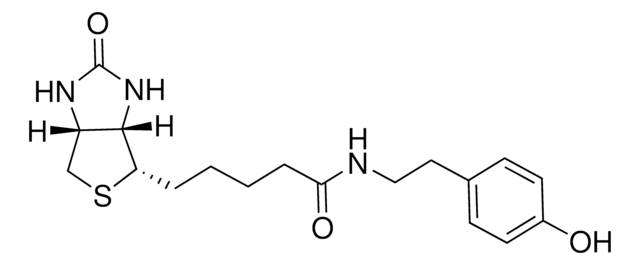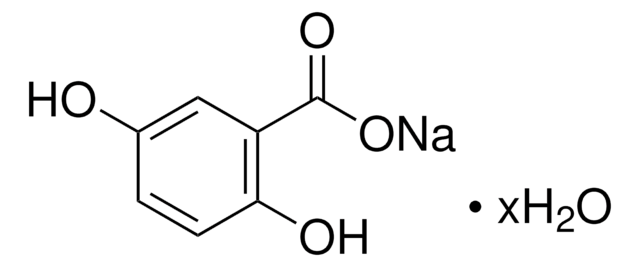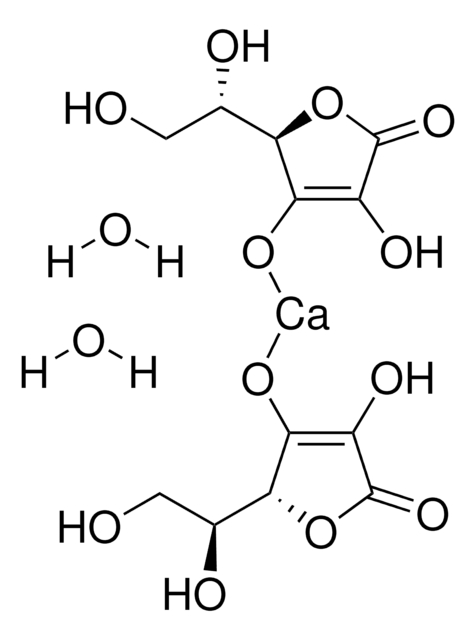11140
(+)-Sodium L-ascorbate
BioXtra, ≥99.0% (NT)
Synonym(s):
L(+)-Ascorbic acid sodium salt, Vitamin C sodium salt
About This Item
Recommended Products
product line
BioXtra
Quality Level
Assay
≥99.0% (NT)
form
powder or crystals
optical activity
[α]20/D +105±2°, c = 5% in H2O
loss
≤0.2% loss on drying, 110 °C
color
white
mp
220 °C (dec.) (lit.)
solubility
water: 642.6 g/L at 20 °C
anion traces
chloride (Cl-): ≤50 mg/kg
sulfate (SO42-): ≤50 mg/kg
cation traces
Ca: ≤50 mg/kg
Cd: ≤5 mg/kg
Co: ≤5 mg/kg
Cr: ≤5 mg/kg
Cu: ≤5 mg/kg
Fe: ≤5 mg/kg
K: ≤50 mg/kg
Mg: ≤5 mg/kg
Mn: ≤5 mg/kg
Ni: ≤5 mg/kg
Pb: ≤5 mg/kg
Zn: ≤5 mg/kg
storage temp.
room temp
SMILES string
[Na+].OC[C@H](O)[C@H]1OC(=O)C(O)=C1[O-]
InChI
1S/C6H8O6.Na/c7-1-2(8)5-3(9)4(10)6(11)12-5;/h2,5,7-10H,1H2;/q;+1/p-1/t2-,5+;/m0./s1
InChI key
PPASLZSBLFJQEF-RXSVEWSESA-M
Looking for similar products? Visit Product Comparison Guide
General description
In biochemical research, L-ascorbic acid sodium salt demonstrates its versatility as a collagen deposition enhancer and an elastogenesis inhibitor. These attributes contribute to its broader applications in understanding cellular processes and mechanisms, making it an indispensable tool for exploring various facets of biochemistry, metabolomics and cellular biology.
Application
- as a standard to study the antioxidant and cytotoxicological effects of aloe vera food supplements
- in the preparation of solution B for the detection of mitochondrial DNA replication using 5-ethynyl-2′-deoxyuridine (EdU)
- to prepare EdU-labeling solution
- to prepare β-galactosidase staining solution
Biochem/physiol Actions
Features and Benefits
- Can be used in Metabolomics and Biochemical research
- High-quality compound suitable for multiple research applications
Other Notes
comparable product
Storage Class Code
11 - Combustible Solids
WGK
WGK 1
Personal Protective Equipment
Choose from one of the most recent versions:
Already Own This Product?
Find documentation for the products that you have recently purchased in the Document Library.
Customers Also Viewed
Articles
Antioxidants protect biological systems from oxidative damage produced by oxygen-containing free radicals and from redoxactive transition metal ions such as iron, copper, and cadmium.
Our team of scientists has experience in all areas of research including Life Science, Material Science, Chemical Synthesis, Chromatography, Analytical and many others.
Contact Technical Service









![Tris[(1-benzyl-1H-1,2,3-triazol-4-yl)methyl]amine 97%](/deepweb/assets/sigmaaldrich/product/structures/179/695/86a721c8-2a4c-4e4f-bc36-6276ce7a941f/640/86a721c8-2a4c-4e4f-bc36-6276ce7a941f.png)
